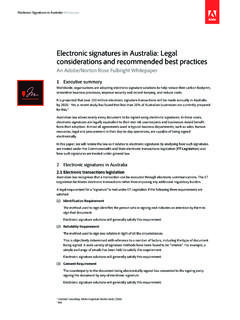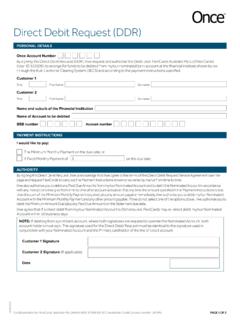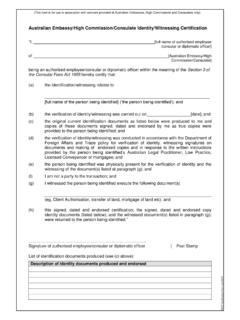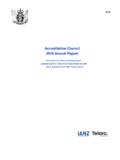Transcription of A Guide to Exemptions in the Electronic Transactions Act ...
1 Galexia Consulting Pty Ltd. ACN: 097 993 498 Email: Web: Ph: +612 9555 5666 Fax: +612 9555 5688 Post: Level 1, 3 Montague St, Balmain (Sydney) NSW 2041, australia - Fantastic Beasts and Where to Find Them - A Guide to Exemptions in the Electronic Transactions Act (ETA) in australia (September 2004) Chris Connolly1 and Prashanti Ravindra2 with assistance from Peter van Dijk3 and Ian Booth4 Galexia Consulting This paper is available in the following formats from < >: HTML5 PDF6 1. Introduction Welcome to the maze of the Electronic Transactions Acts (ETAs) in australia . You will need a large ball of string, or perhaps some bread crumbs. You will also need patience and an eye for detail. This article provides an overview of the Commonwealth ETA and the eight State and Territory ETAs, with a focus on the many Exemptions and how to find them. This is an important area of law for many new technology implementations involving Electronic communication.
2 If a particular transaction is exempt from the ETA in one or more jurisdictions, this can present a significant barrier to the use of Electronic communication. For example, a wholly Electronic process for selling consumer credit products is not viable in many Australian jurisdictions, because consumer credit laws requiring hard copy disclosure documents are exempted from the relevant ETAs. Identifying and locating the relevant ETA exemption can be a difficult and time-consuming task. This article provides some guidance through the ETA maze, and includes an appendix listing common Exemptions and their location. 1 Chris Connolly is a Director of Galexia Consulting and a Visiting Fellow at the University of NSW where he teaches Electronic Commerce Law and Practice. 2 Prashanti Ravindra is a researcher at Galexia Consulting. 3 Peter van Dijk is a Director of Galexia Consulting.
3 4 Ian Booth is the Canberra Associate for Galexia Consulting. 5 HTML version of paper: < >. 6 PDF version of paper: < >. A Guide to Exemptions in the Electronic Transactions Act (ETA) in australia (September 2004) Page 2 Contents 1. Introduction ..1 2. The Australian Electronic Transactions Act(s)..3 3. Types of Exemptions 5 Finding Exemptions 6 A step-by-step Guide to identifying Exemptions : 7 4. Future Developments ..7 The UNCITRAL Draft Convention on Electronic Contracting 7 Case Law - Accommodating Technological Change 8 5.
4 Appendix - Exemptions in Australian ETAs ..9 australia - Electronic Transactions Act 1999 (Cth) 9 Australian Capital Territory - Electronic Transactions Act 2001 (ACT) 11 New South Wales - Electronic Transactions Act 2000 (NSW) 12 Northern Territory - Electronic Transactions Act 2000 (NT) 13 Queensland - Electronic Transactions Act 2001 (Qld) 13 South australia - Electronic Transactions Act 2000 (SA) 14 Tasmania - Electronic Transactions Act 2000 (Tas) 15 Victoria - Electronic Transactions Act 2000 (Vic) 16 Western australia - Electronic Transactions Act 2003 (WA) 17 A Guide to Exemptions in the Electronic Transactions Act (ETA) in australia (September 2004) Page 3 2.
5 The Australian Electronic Transactions Act(s) The inspiration for the Australian Electronic Transactions Act(s) is the UNCITRAL Model Law on Electronic Commerce7 (the Model Law). The Model Law was drafted by the United Nations Commission on International Trade Law (UNCITRAL) in 1996 to assist countries in the framing of legislation which would enable and facilitate Electronic commerce and Electronic government. The Model Law adopts a limited framework approach. It is not intended to be a comprehensive code-like articulation of the rules for Electronic Transactions , nor is it intended to govern every aspect of Electronic contracting. Rather, the aim is to provide essential procedures and principles for Electronic contracting. At the same time the UNCITRAL Model Law, in certain areas, offers enacting States a broad discretion to tailor the Model Law to meet a particular country s needs. The underlying analytical approach of the UNCITRAL Model Law is the functional equivalence approach.
6 This approach evaluates the underlying purposes and functions of traditional paper-based legal requirements and assesses to what extent Electronic Transactions can meet these purposes and functions. Where Electronic Transactions can satisfy the purposes and functions, the UNCITRAL Model Law requires that they be given equal status. In effect, it puts Electronic communications on par with traditional paper-based modes of communication. Therefore, rather than rewriting the law, the UNCITRAL Model Law seeks to extend the scope of standard national legal definitions of writings , signatures and originals to encompass their Electronic counterparts. In australia , the UNCITRAL Model Law has been adopted through the Electronic Transactions Act 1999 (Cth)8 (ETA). The ETA states that Transactions taking place under a law of the Commonwealth will not be invalid just because they are completed electronically. The ETA is based on two principles: 1.
7 Functional equivalence Paper documents and Electronic Transactions are treated equally by the law. 2. Technology neutrality The law does not discriminate between different forms of technology. The ETA allows business and government to fulfil, in Electronic form, any of the following requirements: Giving information in writing; Providing a handwritten signature; Producing a document in material form; and Recording or retaining information. The ETA also provides a legal framework for Electronic contracting. The Act is technology neutral in that it enables Electronic Transactions to occur without prescribing the use of particular types of technology. The key sections are: Section 8 General A transaction is not invalid because it took place wholly or partly by means of one of more Electronic communications. Section 10 Signatures If the signature of a person is required, that requirement may be met by use of an Electronic method as long as: The method is used to identify the person and to indicate their approval of the transaction; 7 < >.
8 8 < >. A Guide to Exemptions in the Electronic Transactions Act (ETA) in australia (September 2004) Page 4 The method is as reliable as appropriate for the purposes of the transaction; and The signature recipient consents. Section 11 Documents A person can produce a document in the form of an Electronic communication where other laws require the production of a paper document. Section 12 Records If a person is required to record or retain information or documentation in writing, that requirement can be met by retaining or recording the information in Electronic form.
9 In order to achieve national uniformity all States and Territories have passed Electronic Transactions Acts that complement the Commonwealth s ETA. This layer of state legislation therefore covers private sector Transactions . The State and Territory counter-parts are: Australian Capital Territory Electronic Transactions Act 2001 (ACT) New South Wales Electronic Transactions Act 2000 (NSW) Northern Territory Electronic Transactions Act 2001 (NT) Queensland Electronic Transactions Act 2001 (Qld) South australia Electronic Transactions Act 2000 (SA) Tasmania Electronic Transactions Act 2000 (Tas) Victoria Electronic Transactions Act 2000 (Vic) Western australia Electronic Transactions Act 2003 (WA) The State and Territory ETAs are generally a mirror of the Commonwealth ETA, with occasional small differences in definitions9, and occasional additional sections10.
10 However, where the mirror breaks, indeed shatters, is in their approach to Exemptions . The scope, type and location of Exemptions differ markedly between jurisdictions. 3. Exemptions It is the numerous Exemptions to the Commonwealth ETA and the State and Territory ETAs which cause the real confusion in this area of law. Having set up a series of Acts which appear, on their face, to enable an Electronic communication to meet the requirements of writing, signatures, material form and record-keeping, the Exemptions then strip away all or part of these provisions in a variety of scenarios. Exemptions do serve their role, and of course some limited Exemptions may be justified. Requirements for some paper based documents and real signatures may be with us for some time to come. However, it is the complexity and inconsistency of the Exemptions that is most worrying for Electronic commerce. It is hard to have confidence in the legal validity or enforceability of an Electronic communication if there is a chance that it is subject to an obscure exemption .






